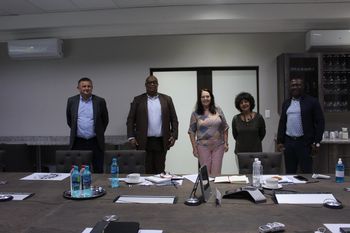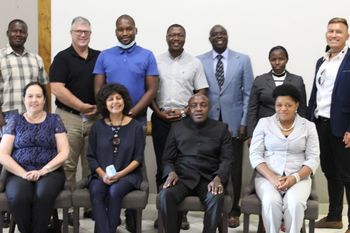EXXARO AND SERITI RESOURCES JOIN FORCES WITH ESKOM IN REALISING A JUST ENERGY TRANSITION TO A LOW CARBON FUTURE IN SOUTH AFRICA
Johannesburg, 25 October 2021: Eskom, Exxaro and Seriti Resources have announced the signing of a landmark Memorandum of Understanding (MOU) that spells out their intention to pursue, co-operatively and individually, the development of renewable energy projects to lower carbon footprint at their operations. In doing so, the parties aim to create employment and re-skilling opportunities for communities living and working at and around their operations and to take a step towards a just transition to a low carbon future in South Africa.
Exxaro and Seriti are the largest coal suppliers to Eskom, contributing around 80% of Eskom’s coal supply per year. By implementing renewable energy solutions at their Eskom-tied operations and at related Eskom sites, Seriti and Exxaro aim to achieve both carbon reduction and cost savings in the generation and use of electricity at these mines. This is symbiotic with Eskom’s mandate to provide electricity in an efficient and sustainable manner, which includes decarbonising its supply chain.
The first phase of the envisaged project pipeline will see the construction of a number of solar photovoltaic facilities both on-mine and at Eskom sites. These may be behind-the-meter solutions (that is, off-grid) or wheeled solutions, or combinations of the two. The companies have committed to begin the projects as soon as possible, subject to regulatory approvals. Further projects envisaged may include energy storage and possibly wind energy facilities.
Under the MOU, Seriti envisages achieving a reduction in CO2 emissions of up to 350,000 tonnes per annum, more than half of its current emissions of 700,000 tonnes of CO2 equivalent through the consumption of coal-fired electricity generation. In respect of Exxaro – the company envisages achieving a reduction in CO2 emissions of up to 130,000 tonnes per annum at its Matla coal mine, which represents a saving of 70% of the greenhouse gasses with Matla at full production.
André de Ruyter, CEO of Eskom said: “Eskom continues to explore means to lower the cost of coal supplied to its power stations, and this investment allows it to advantage of the low
cost of photovoltaic power This is one of the many initiatives Eskom has embarked on to achieve a NetZero status by 2050.”
Mxolisi Mgojo, CEO of Exxaro said: “This is a significant landmark development in South Africa’s energy transition to a low carbon economy for three of South Africa’s largest players in the mining and energy sectors. The investment in decarbonising our mining operations is a systematic and responsible approach to the energy transition without introducing risk to the country’s electricity generation. The collaboration amongst Exxaro, Seriti and Eskom is exemplary of the possibilities achievable through co-operative and constructive relations between business and government in securing livelihoods and a future for South Africa.”
Mike Teke, CEO of Seriti said: “We recognise that climate change and the need to decarbonise our economies is a significant challenge and imperative for South Africa. But, at the same time, we are very conscious that this needs to be done in such a way that does not destroy our industrial base, or the lives of South Africans that rely on our companies for jobs, enterprise and support: this is the very basis of a just transition. As a company, we are fully committed to decarbonisation and a just transition, and in working with our partners – in business, government, labour and communities – in achieving this.”
For further information:
Eskom:
Sikonathi Mantshantsha +27 83 276 0606
E-mail: mediadesk@eskom.co.za
Exxaro:
Mzila Mthenjane +27 83 417 6375
Tsabeng Ntithe +27 76 371 6810
Seriti Resources:
Alan Fine + 27 83 250 0757
Charmane Russell +27 82 372 5816







